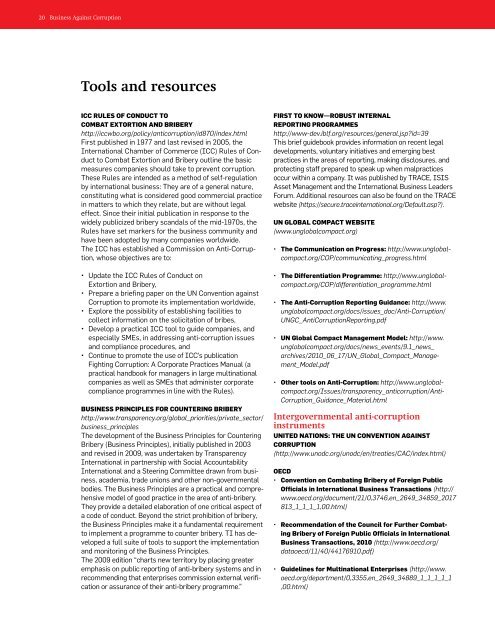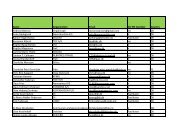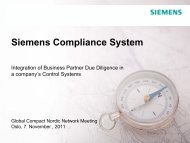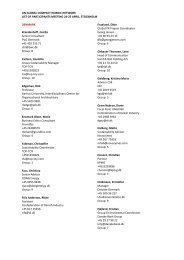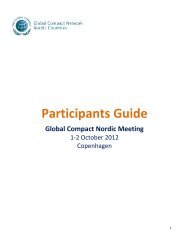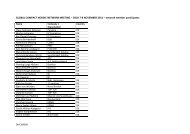Business Against Corruption - A Framework for Action - International ...
Business Against Corruption - A Framework for Action - International ...
Business Against Corruption - A Framework for Action - International ...
- No tags were found...
Create successful ePaper yourself
Turn your PDF publications into a flip-book with our unique Google optimized e-Paper software.
20 <strong>Business</strong> <strong>Against</strong> <strong>Corruption</strong>Tools and resourcesICC Rules of Conduct toCombat Extortion and Briberyhttp://iccwbo.org/policy/anticorruption/id870/index.htmlFirst published in 1977 and last revised in 2005, the<strong>International</strong> Chamber of Commerce (ICC) Rules of Conductto Combat Extortion and Bribery outline the basicmeasures companies should take to prevent corruption.These Rules are intended as a method of self-regulationby international business: They are of a general nature,constituting what is considered good commercial practicein matters to which they relate, but are without legaleffect. Since their initial publication in response to thewidely publicized bribery scandals of the mid-1970s, theRules have set markers <strong>for</strong> the business community andhave been adopted by many companies worldwide.The ICC has established a Commission on Anti-<strong>Corruption</strong>,whose objectives are to:• Update the ICC Rules of Conduct onExtortion and Bribery,• Prepare a briefing paper on the UN Convention against<strong>Corruption</strong> to promote its implementation worldwide,• Explore the possibility of establishing facilities tocollect in<strong>for</strong>mation on the solicitation of bribes,• Develop a practical ICC tool to guide companies, andespecially SMEs, in addressing anti-corruption issuesand compliance procedures, and• Continue to promote the use of ICC’s publicationFighting <strong>Corruption</strong>: A Corporate Practices Manual (apractical handbook <strong>for</strong> managers in large multinationalcompanies as well as SMEs that administer corporatecompliance programmes in line with the Rules).<strong>Business</strong> Principles <strong>for</strong> Countering Briberyhttp://www.transparency.org/global_priorities/private_sector/business_principlesThe development of the <strong>Business</strong> Principles <strong>for</strong> CounteringBribery (<strong>Business</strong> Principles), initially published in 2003and revised in 2009, was undertaken by Transparency<strong>International</strong> in partnership with Social Accountability<strong>International</strong> and a Steering Committee drawn from business,academia, trade unions and other non-governmentalbodies. The <strong>Business</strong> Principles are a practical and comprehensivemodel of good practice in the area of anti-bribery.They provide a detailed elaboration of one critical aspect ofa code of conduct. Beyond the strict prohibition of bribery,the <strong>Business</strong> Principles make it a fundamental requirementto implement a programme to counter bribery. TI has developeda full suite of tools to support the implementationand monitoring of the <strong>Business</strong> Principles.The 2009 edition “charts new territory by placing greateremphasis on public reporting of anti-bribery systems and inrecommending that enterprises commission external verificationor assurance of their anti-bribery programme.”First to Know—Robust InternalReporting Programmeshttp://www-dev.iblf.org/resources/general.jsp?id=39This brief guidebook provides in<strong>for</strong>mation on recent legaldevelopments, voluntary initiatives and emerging bestpractices in the areas of reporting, making disclosures, andprotecting staff prepared to speak up when malpracticesoccur within a company. It was published by TRACE, ISISAsset Management and the <strong>International</strong> <strong>Business</strong> LeadersForum. Additional resources can also be found on the TRACEwebsite (https://secure.traceinternational.org/Default.asp?).UN Global Compact website(www.unglobalcompact.org)• The Communication on Progress: http://www.unglobalcompact.org/COP/communicating_progress.html• The Differentiation Programme: http://www.unglobalcompact.org/COP/differentiation_programme.html• The Anti-<strong>Corruption</strong> Reporting Guidance: http://www.unglobalcompact.org/docs/issues_doc/Anti-<strong>Corruption</strong>/UNGC_Anti<strong>Corruption</strong>Reporting.pdf• UN Global Compact Management Model: http://www.unglobalcompact.org/docs/news_events/9.1_news_archives/2010_06_17/UN_Global_Compact_Management_Model.pdf• Other tools on Anti-<strong>Corruption</strong>: http://www.unglobal-compact.org/Issues/transparency_anticorruption/Anti-<strong>Corruption</strong>_Guidance_Material.htmlIntergovernmental anti-corruptioninstrumentsUnited Nations: The UN Convention against<strong>Corruption</strong>(http://www.unodc.org/unodc/en/treaties/CAC/index.html)OECD• Convention on Combating Bribery of Foreign PublicOfficials in <strong>International</strong> <strong>Business</strong> Transactions (http://www.oecd.org/document/21/0,3746,en_2649_34859_2017813_1_1_1_1,00.html)• Recommendation of the Council <strong>for</strong> Further CombatingBribery of Foreign Public Officials in <strong>International</strong><strong>Business</strong> Transactions, 2010 (http://www.oecd.org/dataoecd/11/40/44176910.pdf)• Guidelines <strong>for</strong> Multinational Enterprises (http://www.oecd.org/department/0,3355,en_2649_34889_1_1_1_1_1,00.html)


